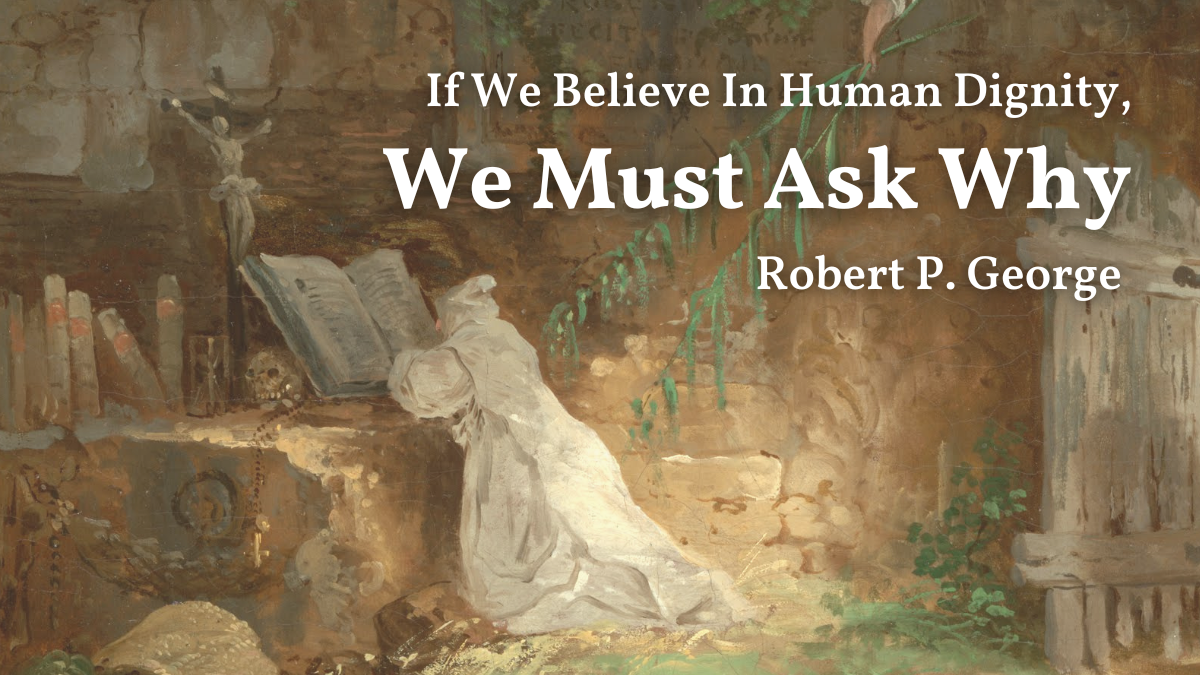This essay is part of a symposium, “Are We Repaganizing?” See the whole collection here.
The great twentieth-century Jewish public intellectual and man of letters Milton Himmelfarb famously defied those of his co-religionists who claim that Judaism cannot be defined. His definition was via negativa: “Judaism is against paganism.” In spite of its brevity, this approach to understanding Judaism—and that other great Jewish religion known as Christianity—is anything but flippant. At the foundation and heart of the Hebrew tradition is the most un-pagan—indeed, anti-pagan—of all teachings: namely, that man, though made from the mere dust of the earth, is fashioned in the very image and likeness of God.
What could such a teaching mean? In other words, how are we mortal, material human beings God-like? It cannot mean that God has five fingers on each of two hands and hair on his head and a nose. God, if he exists, is immaterial. Rather, it means that we human beings, albeit mortal and material, possess the (literally) awesome, God-like powers of reason and freedom. Like God, as he is presented in the book of Genesis, we are able to envisage states of affairs that do not obtain; grasp the value—the intelligible point—of bringing about those states of affairs; and act freely to bring them about, choosing to do so based on our rational grasp of the intelligible point of bringing them into existence, not on mere impulse or instinct in the manner of a brute animal.
In so acting—freely and on reasons—we do more than alter states of affairs in the world external to us. We also shape our own characters. Our agency makes us morally self-constituting creatures. We are responsible for acting virtuously—“fully practically reasonably,” to borrow Aristotle’s language—even when doing so requires us to resist powerful feelings or emotions that tempt us to do otherwise. So, again unlike brute animals, we are creatures who are capable of self-transcendence, self-mastery.
Among the moral truths we can grasp, albeit only with difficulty and in certain ways dimly, by rational inquiry, deliberation, and judgment is the truth that each and every member of the human family—no matter how small, weak, vulnerable, poor, disabled—is the bearer of profound, inherent, and equal dignity. If that stunningly un-pagan and anti-pagan moral proposition is true, then the respect called for by that dignity demands something that is as alien to paganism as it can possibly be: a genuine reverence for human beings—for human life. It requires that we, in the words of Immanuel Kant, “treat humanity, whether in the person of oneself or others, always as an end and never as a means only.” It requires us to abjure practices that paganism valorizes and even glorifies, from unchastity, abortion, and infanticide to slavery, conquest, and domination. And it requires us to abjure these practices even when our own circumstances, desires, and self-interest tempt us to embrace and try to rationalize them.
Of course, the greatest thinkers of pagan antiquity grasped, or partially grasped, moral truths that put them in adversarial postures towards accepted practices of their times and places, including forms of unchastity and homicide. But none fully grasped—and grasped the moral implications of—the principle of profound, inherent, and equal dignity. Indeed, even Jews, Christians, and others who affirm the principle as a matter not only of reason but of divine revelation often fail to grasp its full implications. Paganism is perennially an internal—and not merely an external—challenge to Jewish and Christian faith. Jews and Christians are constantly falling into, or back into, pagan ideologies and practices. Today, entire denominations have declared themselves in support of neo-pagan practices of various sorts that are explicitly in conflict with the biblical witness.
But for anyone who truly grasps the principle, and has some conception of its full moral implications, the question naturally arises: How is it that human beings have the powers they have, grounding the dignity they possess, possess equally (despite obvious differences of strength, intelligence, beauty, talent, wit, charm, wealth, social rank, and so forth), and possess in virtue of nothing other than their nature as rational creatures, nothing other than their humanity? It is difficult—indeed, it seems to me impossible—to find a credible competitor to the account set forth in Genesis 1, the imago dei, the proposition that man is made in the very image and likeness of the good and loving God who is creator and ruler of all that is.
If that is so, then the question “Should I be religious, or should I be secular?” answers itself. Then, the spiritual quest—the quest for the fullness of religious truth—begins.



